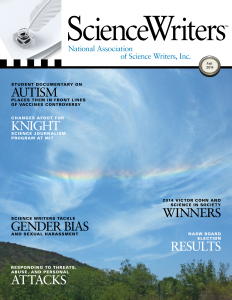By Kevin Begos
Science writers have always had to cope with angry readers or industries who don’t like their stories. Responding to criticism is part of the job. But these days journalists, PIOs, and scientists find themselves facing personal attacks and even death threats. Just writing about global warming, GMOs, or vaccines can trigger personal attacks or lawsuits. Women are also subjected to harassment, stalking, threats of rape, and barrages of pornography.At first glance, the trend seems depressingly clear. “Web Trolls Winning as Incivility Increases,” notes a recent New York Times headline. But there’s another question: Why, in a larger sense, are these things happening?
Whitney Phillips, a Humboldt State University lecturer and author of a forthcoming book about trolling, notes in an email that the abuse often isn’t accidental. She writes widely on the topic and observed that, beginning about 10 years ago, trolling was something that one actively chose to do. More importantly, a troll was something one chose to be.” But Phillips adds that “lumping ‘trolls’ into one discrete group is not only not helpful; it’s harmful,” especially given the uncomfortable fact that many media outlets thrive on sensationalism and the clicks it can bring.
Some journalists and scientists are finding ways to cope with, confront, and even stop abuse, through everything from respectful dialogue to reporting threats to the FBI. Yet the abuse is part of a larger shift, where social media and the Internet have empowered legions of enthusiastic readers, but also those who enjoy inflicting emotional harm.
“The barrage, from both ends of the ideological spectrum, seemed to begin in the mid 2000s, reflecting the rise of environmental blogging and the like,” said New York Times writer Andrew Revkin, who has been covering climate and environmental issues for more than 25 years. “I’ve tasted some of this when writing on other subjects, from chemical risk and nuclear energy to fracking and GMOs.”
After Revkin spoke in 2009 about population and climate change, Rush Limbaugh suggested “that I kill myself to save the planet. That remark was followed by a couple of disturbing telephone death threats.”
“How do I deal with it? I respond when I think someone’s aim is to undercut my credibility, which of course is the source of my value to readers and to my employers,” Revkin said. “I ignore most everything else, unless someone has identified a weak spot in my arguments or evidence base. Then I factor what has been said into how I gauge an issue — trying to setting aside the bile in which it was wrapped.”
For science journalists used to tough but rational discourse, getting sucked into a whirlpool of attacks can be a shock. Nathanael Johnson did a 29-part series for Grist about genetically modified food that was praised by many journalists. He’d envisioned the project as a way to engage people. He got that, but also critics who launched a series of attacks on his integrity. I’ve had the same experience writing about fracking and climate change, and it’s confusing until you start to understand that it’s just the reality for almost anyone who writes about controversial topics now.
“That was really just kind of frightening, and sort of made me question myself. I’m used to this kind of feeling, we’re all in this together, just trying to get the facts right,” Johnson said. But “emails would come in just dripping with condescension. It was just a really toxic relationship to have” with some readers.
Johnson ultimately found ways to move some readers back to a more respectful dialogue, but it was a painful process with “a lot of soul searching.” He tried to bridge the gap with emails, but came to see that is often not the best medium for resolving conflicts. A more personal approach helped. Johnson called some critics and essentially told them “look, you’ve got to treat me better” to have a dialogue. “Pretty much every single time I’ve called people on it, they’ve apologized,” he said.
But some attacks are in another category. Amy Wallace, an editor for Los Angeles magazine who has written about the anti-vaccine movement, noted that a disproportionate amount of online abuse is directed toward women, along with many threats of violence.
“This kind of vitriol is not designed to hold reporters accountable,” Wallace wrote in the New York Times earlier this year. “Instead, it seeks to intimidate and, ultimately, to silence female journalists who write about controversial topics.”
Emily Graslie, who creates videos and programs for Chicago’s Field Museum of Natural History, recently tweeted that “Not a day goes by I don’t deal with harassment.”
Graslie hosts a popular series of YouTube videos, many of which have gotten more than 100,000 views. But she also has to deal with obscene and harassing comments.
“It’s not just one or two people. It’s a lot,” Graslie said, adding that most science communicators have no training in how to deal with anonymous or even non-anonymous harassment, or blatantly unfair criticism.
Graslie has turned to family, colleagues, and online networks for support, but said the harassment “does take quite a bit of personal energy.” The worst backlash doesn’t come in response to hot topics like evolution.
“It’s mostly when I post things on my social sites that talk about lack of support for women in science, or anything that has anything to do with women in science,” she said.
In a Pacific Standard essay earlier this year, Amanda Hess wrote about one abusive tweet that read “Happy to say we live in the same state. Im (sic) looking you up, and when I find you, im (sic) going to rape you and remove your head.”
Tyrone Hayes, a scientist at the University of California-Berkeley, notes that the history of such abuse predates the Internet. “Especially in the area of environmental science, it’s mostly been women that have been the target, going all the way back to Rachael Carson.”
Hayes, who has been attacked by industry critics for his research showing how chemicals and pesticides can hurt amphibians and people, said he thinks some corporations “have a methodology and strategy” of making women and minorities “feel threatened, making you feel isolated.”
Catherine Rampell, a Washington Post columnist, recently wrote about a study that questioned whether “promiscuous women are doomed to unhappy marriages” and then tweeted “Trolls, I await you.”
So where can a journalist or scientist turn for help? There are resources (see "Responding to criticism and personal attacks," below), and even encouraging cases of the online world policing itself.
Hayes said he was “really impressed” that the volunteer referees on Wikipedia identified false accusations against him and told one person who was making them to cease, or be banned from making comments.
Phillips adds that while “don’t feed the trolls” is common and often useful advice, that “places blame for whatever unpleasantness squarely at the target’s feet. If only the target hadn’t fed the trolls, the argument goes, the trolls wouldn’t have done what they did!”
When writing about controversial topics, the basics are more crucial than ever: Double-check everything for accuracy and context. Like journalists who cover wars, be emotionally prepared for conflict, and don’t obsess over cruel but baseless attacks.
Ultimately, consider the big picture. Abuse isn’t just about journalism or science. “It’s not a question of whether or not we’re winning the war on trolling, but whether we’re winning the war on misogyny, or racism, and ableism,” Phillips told the New York Times recently. “Trolling is just a symptom of those bigger problems.”
Kevin Begos is a contributor to A Field Guide for Science Writers and a former MIT Knight Science Journalism Fellow. He’s a coauthor of Against Their Will: A History of North Carolina’s Eugenic Sterilization Program.
Responding to criticism and personal attacks
The Union of Concerned Scientists has prepared a free, downloadable brochure with advice on responding to personal attacks. Science in an Age of Scrutiny contains guidelines for threats and abuse broken down into categories: harassing correspondence, hostile blogger, demand for private information, and attacks through a mainstream source. Written for scientists, much of the advice also applies to journalists and science writers responding to criticism and personal attacks.
You should
- Determine whether the blog is highly trafficked or obscure. Highly trafficked blogs have lots of comments and tens of thousands of readers.
- Evaluate the blog’s tone and track record. Knowledgeable colleagues can help you determine if a particular blog is often the source of such attacks.
- Ignore spurious claims from obscure blogs with small audiences. Treat them like harassing emails.
- Consider responding calmly and with the facts to attacks from more prominent blogs, but do so on your own blog, Facebook page, institutional blog, or other outlet.
- Acknowledge valid criticisms and strongly rebut invalid ones.
- Prepare a response in case attacks gain traction with other bloggers and mainstream media outlets start to take an interest.
- Copy and paste the blog and related material into a Word document, and take screen shots of any offensive material.
- Contact law enforcement if you see any content or receive any correspondence that contains a clear and explicit threat to someone’s life, health, or safety.
Try to Avoid
- Posting a response in the comment section of the blog. You will provoke the blog author and readers, and the former can edit or manipulate your comment.
- Getting drawn into an endless exchange with a blogger. A single response on your own blog or other online arena you control is often adequate.
- Ignoring valid criticism. It is possible to mollify reasonable bloggers who have taken issue with an aspect of your research. Refusing to answer valid criticism can engender attacks.
- Mistaking an obscure blog for a legitimate media source.
Download Science in an Age of Scrutiny — How Scientists Can Respond to Criticism and Personal Attacks at bit.ly/1fShwPj.


